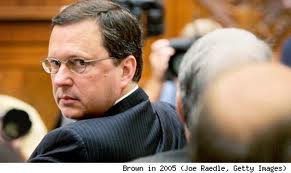Brownie’s Party, Still
Noah Millman, who isn’t a Republican, says that if there’s a post-election GOP civil war, all he wants out of it is a return to a party fit to govern. Excerpt:
Conor Friedersdorf gets it pretty much exactly right in his recent piece: the mainstream of the GOP has completely wasted the past four years refusing to even think intelligibly about foreign policy, and as a result has completely lost the party’s once historic advantage in foreign affairs. So long as Presidential nominees are required to compete over who is more of a super-hawk, the GOP is not going to be trusted on this question – or, if they are, that will be a very dangerous sign for the health of America.
There are lots of alternatives to uber-hawkishness besides Ron Paul-style non-interventionism. Liberal internationalism and traditional realism are the two most obvious of such alternatives, and no doubt there are more. My bar is relatively low: that the GOP begin to actually debate foreign policy, as if there might be multiple possible answers to foreign policy questions, and as if you don’t automatically win by staking out the most hawkish position.
Similarly on taxes, where GOP primaries have become a contest over who can offer the most extravagant tax-cut plan (leavened with some concern about electability). The most telling moment in the GOP primary debates from my perspective was when the entire field of candidates refused a deficit reduction deal premised on $10 in spending cuts for every $1 of tax hikes. The national GOP’s position, right now, is that there are no circumstances whatsoever that justify increases in taxes. That is not a position of a governing party – period.
I recommend Conor’s piece as well. It does a bang-up job of knifing Obama’s foreign policy mistakes while leaving absolutely no doubt that the Republicans would be worse. Back to Noah’s bit: he (and Conor) speak well about why I, as a conservative, am extremely reluctant to vote for Romney — or would be reluctant to vote for anybody the GOP had nominated. I do not trust that this is a competent governing party.
It all goes back to the Bush administration, and the evident failure of the GOP to have learned from its foreign policy and economic mistakes. I’ve written about that at length elsewhere, and don’t want to go into it again here. The point, though, is that a party that is serious about wanting to be in charge of things is a party that will have done a serious assessment of what went wrong before, and will have come up with a program based in part on what it learned from that assessment. This the Republican Party has not done.
Back in the 1980s, when I was in college, one of the reasons I ceased being liberal and migrated to the conservative camp was because conservatives, it seemed to me, were more realistic. Liberals — and again, I was one — were so caught up in the abstractions of ideology that we didn’t grasp how the things we assumed were true did not comport with the world as it was. Moreover, I came to see that some of the principles and convictions on which liberal governance was based were flawed. The fact that the Democratic Party at the time seemed to think the only thing to be done was to double down on what had ceased to work was, to me, a sign that liberalism had intellectually ossified, and was more interested in telling itself a tale about the world than in governing.
That’s not the only reason I became a conservative, mind you, but losing faith in liberalism’s account of our political and cultural condition, and in the ability of political liberals to face their own failures, was the beginning of something.
Noah’s entry brought to mind the single event that began to cause me to lose faith in the Republican Party as a serious party of governance: Hurricane Katrina.
To be clear, I’m not one to blame the government’s disastrous response to Katrina on George W. Bush. The Louisiana state government, headed at the time by a Democrat, bears some of the fault, as do local governments. Nevertheless, what we learned about the infamous Michael “Brownie” Brown, taught me a lot.
You remember Brownie, don’t you? He was the vain and incompetent head of FEMA, a Bush political appointee. It turned out that he had no previous emergency management experience. He was a Republican Party hack who had been rewarded for his political reliability with a critically important government position — a position that, after 9/11, ought to have been given to a skilled emergency manager. Having seen what a failed government response at the federal level meant for my home state, and having observed that Bush trusted the federal response to a political hack, told me that the GOP cared more about ideological reliability than basic competence.
Bush ran what The New Republic called a hackocracy. The Harriet Miers fiasco later that fall — which occasioned a conservative revolt — cemented this impression for me, and made me think more critically about the entire Bush enterprise, especially the war. Eventually I came to see that conservatism in power had become so enthralled to its own myth-making and loyalty tests that it was not to be trusted with power.
I don’t like the Obama administration. I didn’t vote for Obama, and it’s hard for me to see voting for Obama this time around. I don’t think the Democrats are entirely free from the hackocratic curse; it’s part of politics. But it’s equally hard, and maybe even harder, to see voting for Romney, and rewarding the conservative party with power that it does not deserve, and which I’m convinced it would misuse.

